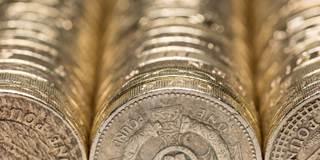With Britain’s current-account deficit running at over 7% of GDP – by far the largest since data started being collected in 1955 – sterling's 16% depreciation since the June Brexit vote could be regarded as a boon. But a weakening pound could actually hurt British competitiveness.
LONDON – The most dramatic economic effect of the United Kingdom’s Brexit vote has been the collapse of sterling. Since June, the pound has fallen by 16% against a basket of currencies. Mervyn King, the previous governor of the Bank of England, hailed the lower exchange rate as a “welcome change.” Indeed, with Britain’s current-account deficit running at over 7% of GDP – by far the largest since data started being collected in 1955 – depreciation could be regarded as a boon. But is it?

LONDON – The most dramatic economic effect of the United Kingdom’s Brexit vote has been the collapse of sterling. Since June, the pound has fallen by 16% against a basket of currencies. Mervyn King, the previous governor of the Bank of England, hailed the lower exchange rate as a “welcome change.” Indeed, with Britain’s current-account deficit running at over 7% of GDP – by far the largest since data started being collected in 1955 – depreciation could be regarded as a boon. But is it?